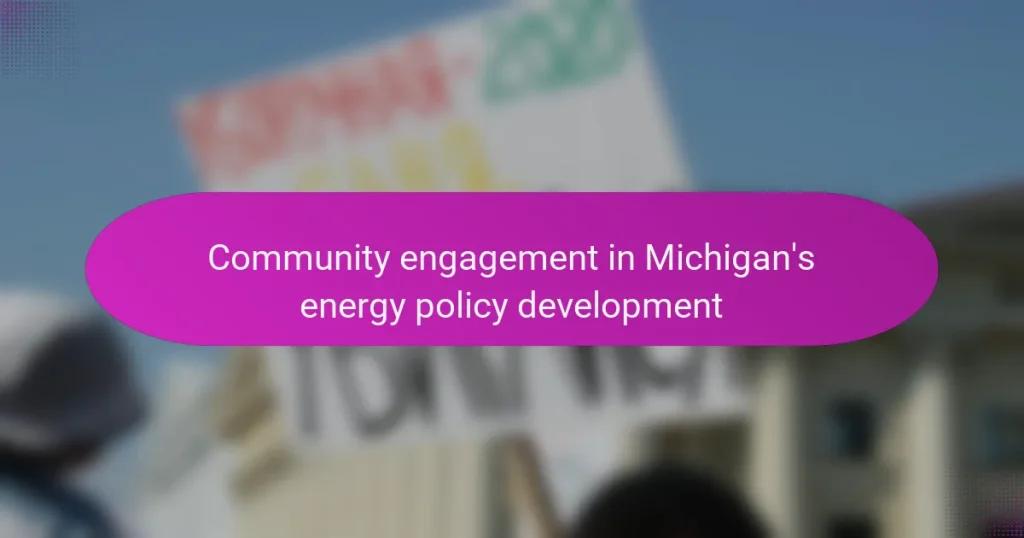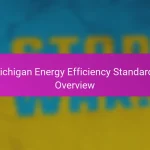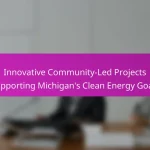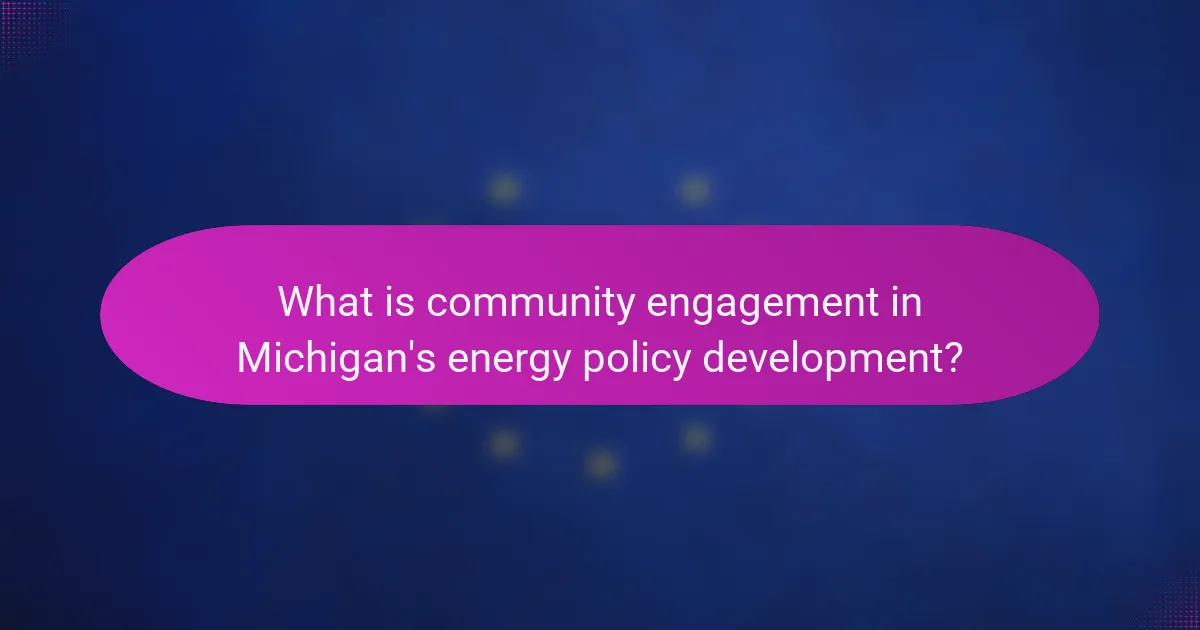
What is community engagement in Michigan’s energy policy development?
Community engagement in Michigan’s energy policy development refers to the active involvement of citizens in shaping energy policies. This process includes public consultations, workshops, and forums where residents can express their views. Stakeholder participation is essential for ensuring diverse perspectives are considered. Engaging communities helps to identify local energy needs and preferences. It also fosters transparency and builds trust between policymakers and the public. Michigan’s approach emphasizes collaboration between government agencies and local organizations. This engagement is crucial for developing effective and inclusive energy strategies. Research indicates that inclusive policy development leads to better outcomes and community satisfaction.
How does community engagement influence energy policy decisions in Michigan?
Community engagement significantly influences energy policy decisions in Michigan. It allows residents to voice their concerns and preferences regarding energy sources and sustainability. Through public forums and stakeholder meetings, community input shapes policy priorities. For instance, the Michigan Public Service Commission actively seeks public comments during energy planning processes. This feedback can lead to adjustments in energy efficiency programs and renewable energy initiatives. Additionally, community engagement fosters collaboration between policymakers and local organizations. Such partnerships can enhance trust and transparency in decision-making. Overall, engaged communities can drive more equitable and effective energy policies in Michigan.
What are the key components of effective community engagement?
The key components of effective community engagement include clear communication, active participation, and mutual respect. Clear communication ensures that information is shared transparently and understandably. Active participation involves engaging community members in decision-making processes. Mutual respect fosters trust and collaboration among stakeholders. Research shows that communities with effective engagement strategies see higher satisfaction and better outcomes. For instance, a study by the International Association for Public Participation found that inclusive practices lead to more informed and effective policy decisions.
How does community participation shape policy outcomes?
Community participation shapes policy outcomes by ensuring that diverse perspectives are included in decision-making processes. Engaging citizens allows policymakers to understand local needs and priorities. This involvement leads to policies that are more relevant and effective. For instance, studies show that community input can improve the implementation of energy policies by aligning them with public interests. In Michigan, community engagement has led to increased support for renewable energy initiatives. Research by the Michigan Public Service Commission highlights that participatory approaches enhance transparency and accountability in energy policy development. Therefore, community participation directly influences the effectiveness and acceptance of policy outcomes.
Why is community engagement important in energy policy development?
Community engagement is crucial in energy policy development because it ensures that policies reflect the needs and values of the community. Engaging local stakeholders fosters transparency and builds trust between policymakers and residents. This collaboration can lead to more effective and sustainable energy solutions. Research shows that communities involved in the policy-making process are more likely to support and adhere to energy initiatives. For example, the U.S. Department of Energy emphasizes that community input leads to better energy efficiency programs. Additionally, inclusive engagement can highlight unique local challenges and opportunities, resulting in tailored energy strategies.
What benefits does community engagement provide to policymakers?
Community engagement provides policymakers with valuable insights into public needs and preferences. It fosters trust between the community and government. Engaged citizens can offer diverse perspectives that enhance policy effectiveness. Research shows that policies developed with community input are more likely to be accepted. A study by the International Association for Public Participation highlights that community engagement leads to better decision-making outcomes. Policymakers can identify potential challenges early through community feedback. This proactive approach minimizes opposition and enhances policy implementation. Overall, community engagement strengthens democratic processes and accountability in policymaking.
How does it enhance public trust and transparency?
Community engagement in Michigan’s energy policy development enhances public trust and transparency by involving citizens in decision-making processes. This participatory approach allows stakeholders to voice concerns and contribute ideas. Open forums and discussions provide clarity on policy impacts. Transparency is increased through accessible information sharing. When citizens see their input reflected in policies, trust in governmental institutions grows. Studies show that engaged communities are more likely to support energy initiatives. For example, the Michigan Public Service Commission reported higher satisfaction rates among communities actively involved in energy planning. Overall, this engagement fosters a sense of ownership and accountability in energy policy.
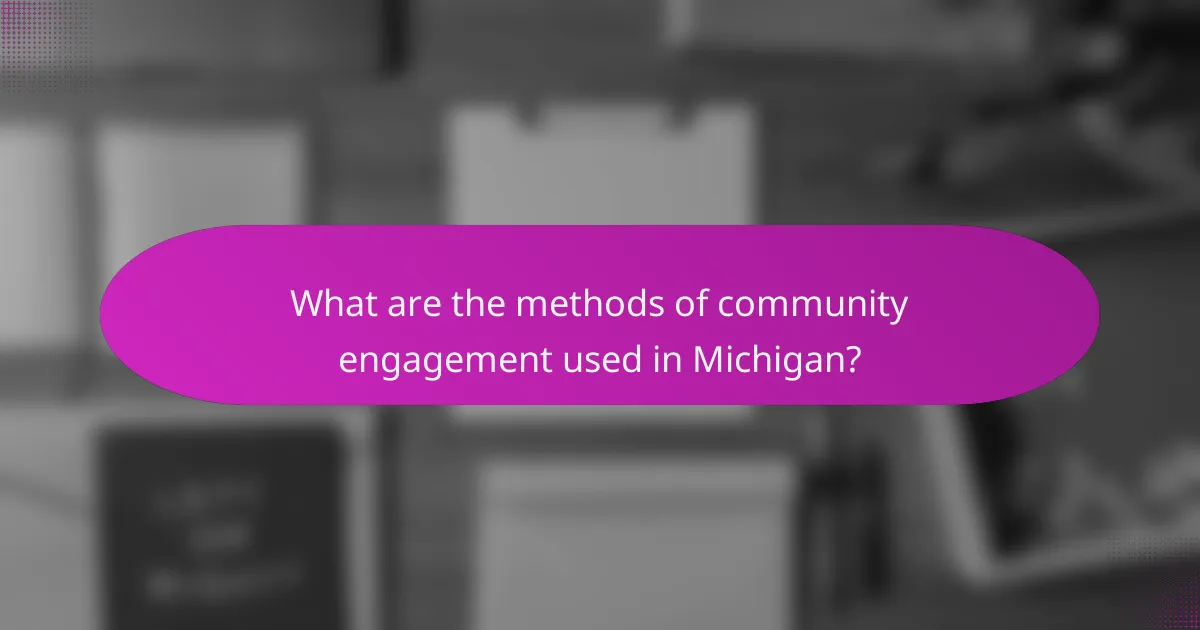
What are the methods of community engagement used in Michigan?
Community engagement methods used in Michigan include public meetings, surveys, and stakeholder workshops. Public meetings allow residents to voice their opinions and ask questions. Surveys gather input from a broader audience on specific issues. Stakeholder workshops facilitate in-depth discussions among key community members and organizations. These methods aim to enhance transparency and collaboration in energy policy development. Research by the Michigan Public Service Commission indicates that these approaches improve community trust and involvement in decision-making processes.
How do public forums and town hall meetings contribute to community engagement?
Public forums and town hall meetings enhance community engagement by providing platforms for direct communication between residents and policymakers. These gatherings allow community members to voice their concerns and opinions regarding local issues. In Michigan, they facilitate discussions on energy policy, ensuring that diverse perspectives are considered in decision-making. Research shows that community input can lead to more informed policies that reflect the needs of residents. Additionally, these events foster a sense of community ownership and responsibility. Engaged citizens are more likely to participate in future civic activities, creating a cycle of ongoing involvement.
What are the best practices for conducting effective public forums?
Effective public forums should be structured to encourage participation and transparency. Start by clearly defining the purpose and agenda of the forum. This sets expectations and keeps discussions focused. Ensure the venue is accessible to all community members. Accessibility promotes inclusivity and higher attendance rates.
Facilitate open dialogue by employing a skilled moderator. A moderator ensures all voices are heard and manages time effectively. Use various engagement methods, such as small group discussions or Q&A sessions. These methods allow for diverse perspectives and deeper conversations.
Provide clear information in advance about the topics to be discussed. This helps participants prepare and engage meaningfully. Collect feedback during and after the forum to understand community needs and improve future events. Documenting feedback demonstrates that community input is valued and considered.
Lastly, follow up with participants after the forum. Share outcomes and how their input will influence energy policy development. This builds trust and encourages ongoing community engagement. These best practices are supported by successful case studies in community engagement across various sectors.
How do town hall meetings facilitate dialogue between stakeholders?
Town hall meetings facilitate dialogue between stakeholders by providing a structured platform for open communication. These meetings allow community members, local leaders, and policymakers to gather in one space. Stakeholders can express concerns, share ideas, and ask questions directly. This face-to-face interaction fosters trust and transparency. Research shows that community engagement improves policy outcomes. For example, the Michigan Public Service Commission highlights the importance of stakeholder input in energy policy decisions. Engaging stakeholders through town hall meetings leads to more informed and effective policies.
What role do surveys and feedback mechanisms play in community engagement?
Surveys and feedback mechanisms are essential tools for community engagement. They facilitate direct communication between policymakers and community members. Surveys gather opinions and preferences from residents. This data helps identify community needs and priorities. Feedback mechanisms allow ongoing dialogue, fostering trust and transparency. They also enable adjustments to policies based on community input. For instance, the Michigan Energy Policy Development process uses surveys to assess public sentiment. Research shows that communities involved in feedback processes are more likely to support energy initiatives. This demonstrates the effectiveness of surveys in enhancing community participation and collaboration.
How can surveys be designed to gather meaningful input?
Surveys can be designed to gather meaningful input by ensuring clarity in questions. Clear and concise questions reduce ambiguity. They should avoid jargon to be easily understood by all respondents. Including a mix of question types enhances engagement. For example, use multiple-choice, open-ended, and Likert scale questions. This variety can capture different perspectives.
Additionally, surveys should be tested before full deployment. Pilot testing allows for adjustments based on feedback. Analyzing pilot responses can identify confusing questions. Surveys should also ensure anonymity to encourage honest responses. Research shows that anonymity increases the likelihood of candidness.
Lastly, surveys should be distributed widely to reach a diverse audience. A larger sample size improves the representativeness of the data collected. Engaging various community groups can enhance participation rates. Overall, these strategies lead to more meaningful and actionable survey results.
What are the challenges of interpreting survey results?
Interpreting survey results presents several challenges. One challenge is response bias, where participants may not answer truthfully. This can skew the data and lead to inaccurate conclusions. Another challenge is the wording of questions, which can influence how respondents interpret and answer them. Ambiguous or leading questions can result in misinterpretation of the data. Additionally, sample size and representativeness are crucial. A small or unrepresentative sample can limit the generalizability of the results. Variability in participant understanding of survey topics can also affect outcomes. Lastly, the timing of the survey can impact responses, as opinions may change over time. These factors complicate the analysis and interpretation of survey data.
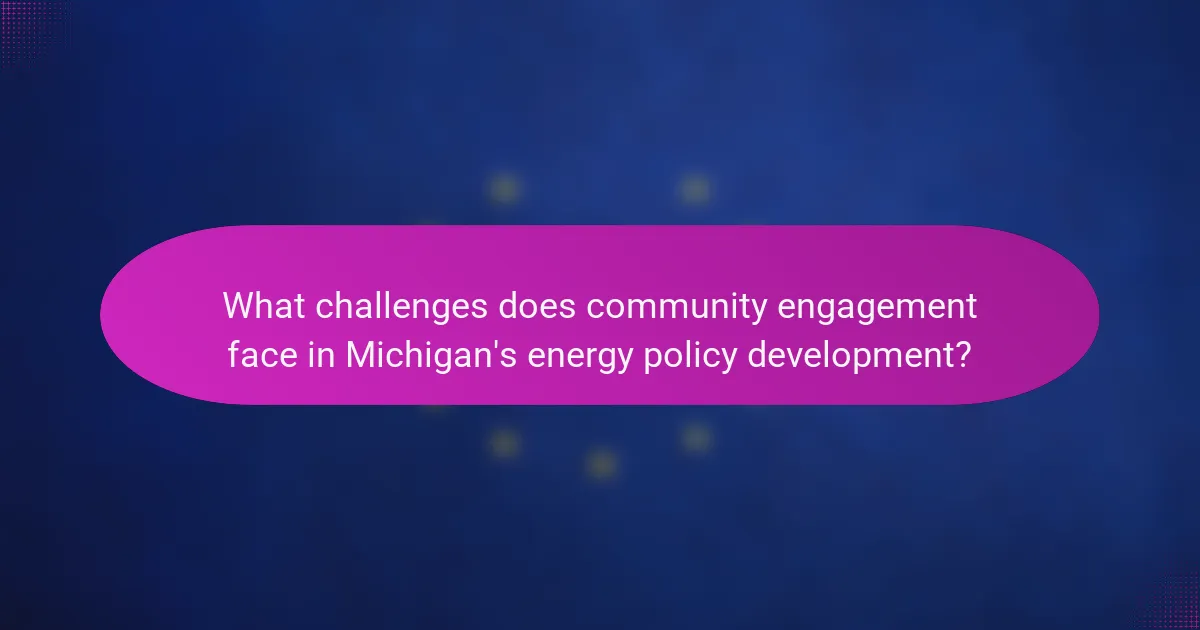
What challenges does community engagement face in Michigan’s energy policy development?
Community engagement in Michigan’s energy policy development faces several challenges. One significant challenge is the lack of awareness among residents about energy issues. Many community members do not understand the complexities of energy policy. This gap in knowledge can lead to low participation in engagement activities. Additionally, there is often a disconnect between policymakers and local communities. Policymakers may not effectively communicate the implications of energy policies. Another challenge is the diversity of community interests and priorities. Different groups may have conflicting views on energy solutions. This can complicate consensus-building efforts. Lastly, resource limitations hinder effective engagement. Many communities lack the financial and human resources needed for comprehensive outreach. These challenges collectively impede meaningful community involvement in shaping energy policy in Michigan.
What barriers exist to effective community participation?
Barriers to effective community participation include lack of awareness, limited access to information, and insufficient resources. Many community members are unaware of energy policy issues that affect them. This lack of awareness can lead to disengagement. Limited access to relevant information hinders informed participation. Communities often lack the resources needed for effective engagement, such as funding or staff. Additionally, language barriers can exclude non-English speakers from discussions. Trust issues between communities and policymakers can further discourage participation. A study by the Michigan Public Service Commission highlights these challenges in community engagement efforts.
How do socioeconomic factors affect engagement levels?
Socioeconomic factors significantly influence engagement levels in community activities. Individuals from higher socioeconomic backgrounds often have more resources and time to participate. Conversely, those from lower socioeconomic statuses may face barriers such as financial constraints or lack of access to information. Research shows that communities with higher income levels typically exhibit greater civic engagement. A study by the Pew Research Center indicates that education and income are strong predictors of political and community involvement. Additionally, social networks in affluent areas can enhance participation, while marginalized communities may experience isolation.
What role does misinformation play in community engagement?
Misinformation undermines community engagement by creating distrust and confusion among residents. It leads to misinterpretations of energy policies and initiatives. This confusion can result in decreased participation in community discussions. Moreover, misinformation can polarize opinions, making it difficult to reach consensus. A study by the Pew Research Center found that 64% of Americans believe misinformation causes confusion about important issues. In the context of Michigan’s energy policy, misinformation can hinder effective communication between policymakers and the community. Ultimately, misinformation disrupts the collaborative process essential for successful community engagement.
How can these challenges be overcome?
Challenges in community engagement in Michigan’s energy policy development can be overcome through targeted strategies. First, establishing clear communication channels fosters trust and transparency. Regular public forums and workshops can facilitate dialogue between policymakers and residents. Utilizing digital platforms for outreach enhances accessibility and participation. Collaborating with local organizations can help tailor engagement efforts to community needs. Providing educational resources empowers residents to contribute meaningfully. Lastly, incorporating feedback into policy decisions demonstrates responsiveness and builds community investment in outcomes. These strategies have been effective in similar contexts, as seen in successful community initiatives across various states.
What strategies can be implemented to improve engagement?
Implementing targeted outreach strategies can significantly improve community engagement in Michigan’s energy policy development. These strategies include hosting public forums to gather input directly from residents. Surveys can also be distributed to collect feedback on energy initiatives. Utilizing social media platforms helps reach a broader audience effectively. Collaborating with local organizations can enhance trust and participation. Providing educational resources informs the community about energy policies. Transparency in decision-making fosters a sense of ownership among residents. Regular updates on policy developments keep the community informed and engaged. Research shows that inclusive engagement practices lead to higher community participation rates and better policy outcomes.
How can technology be leveraged to enhance community participation?
Technology can enhance community participation by providing accessible platforms for communication and collaboration. Digital tools like social media facilitate real-time interaction among community members. Online surveys and polls allow for gathering diverse opinions efficiently. Virtual meetings enable participation from individuals unable to attend in person, increasing inclusivity. Geographic Information Systems (GIS) can visualize community data, helping residents understand local energy issues better. Mobile applications can deliver updates and alerts on energy policies directly to community members. Research indicates that communities using technology for engagement see higher participation rates and more informed decision-making. For example, a study by the International Association for Public Participation found that online engagement tools increased public involvement by 40% in various projects.
What are some best practices for fostering community engagement in energy policy?
Best practices for fostering community engagement in energy policy include establishing clear communication channels. These channels should provide accessible information about energy policies. Regular public meetings can encourage participation and feedback. Engaging local leaders and organizations can also enhance trust and outreach. Utilizing surveys and polls helps gather community opinions effectively. Providing educational resources increases awareness of energy issues. Collaborating with diverse stakeholders ensures representation of various community interests. Lastly, transparency in decision-making processes builds credibility and encourages ongoing engagement.
Community engagement in Michigan’s energy policy development involves active citizen participation in shaping energy policies through public consultations, workshops, and forums. This process is essential for incorporating diverse perspectives, identifying local energy needs, and fostering transparency between policymakers and the public. Key components of effective engagement include clear communication, active participation, and mutual respect, while challenges such as lack of awareness and misinformation can hinder involvement. The article explores methods, benefits, and best practices for enhancing community engagement, emphasizing the importance of collaboration and feedback in developing effective energy policies.
